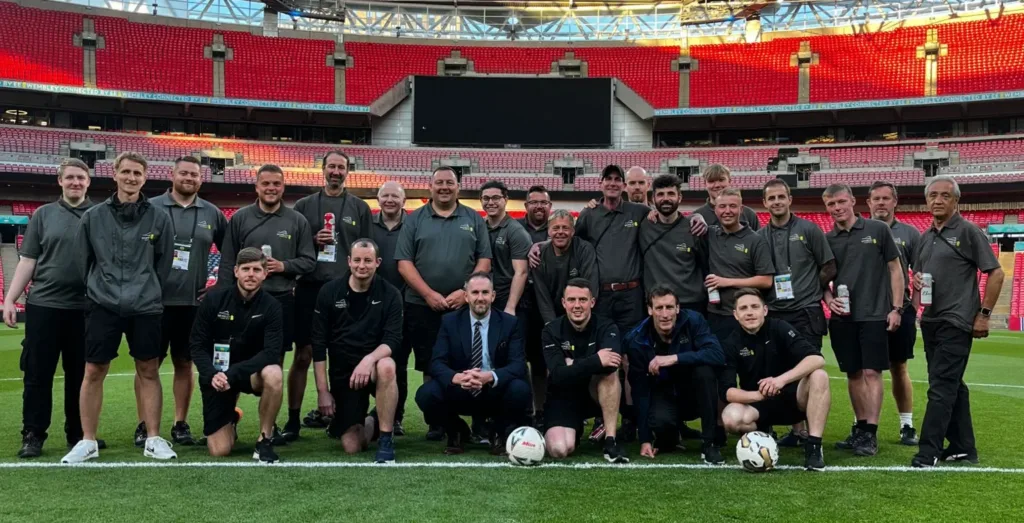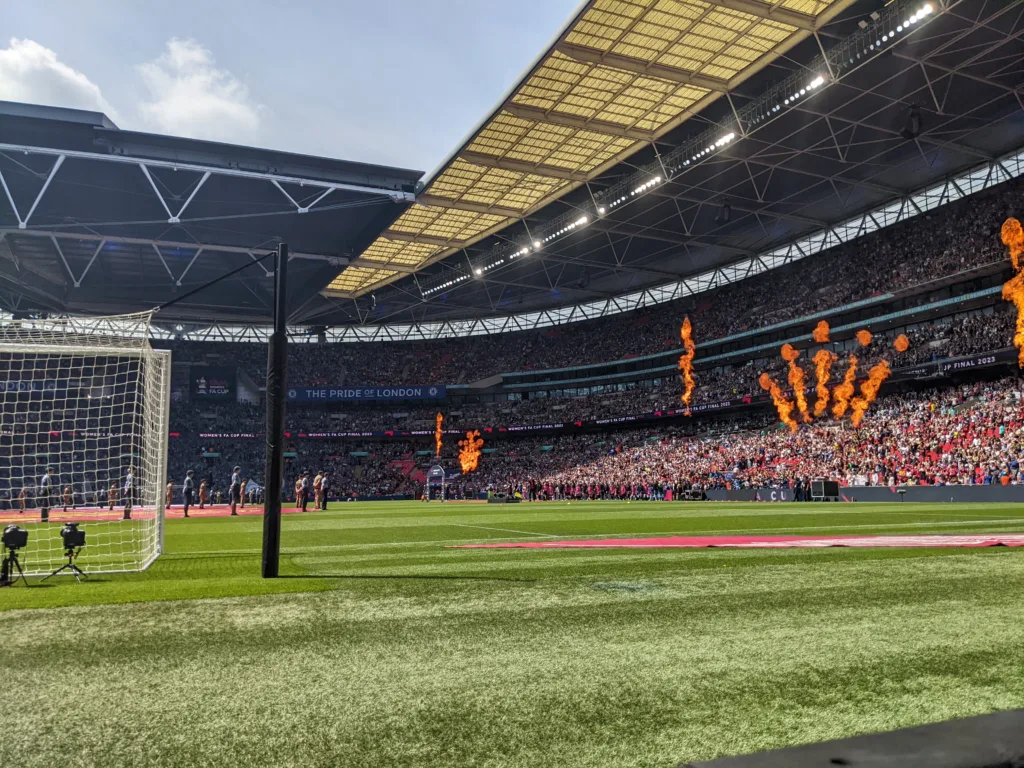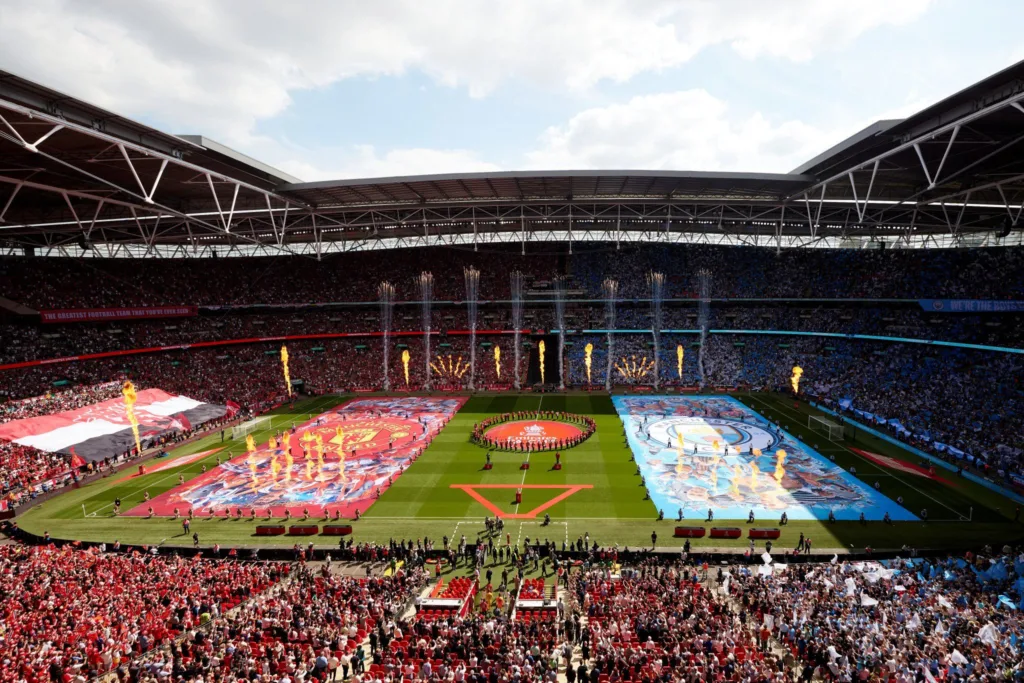One of our founding members, Bradley Tennant, secured an opportunity in 2023 to work as a member of support staff on the grounds team for London’s iconic Wembley Stadium. Here, he tells us how he got the job and shares an insight into his daily routine at the largest sports venue in the UK.

How did you manage to secure what must have been quite a competitive job position?
I actually just applied the generic way: by responding to a job posting. The post was for Wembley match day ground staff, and I applied in October after seeing an advert online. I live semi-locally and I’ve always dreamed of working at Wembley in some capacity, so I decided to take the opportunity while it made the most sense.
What happened next? When did you receive a response from the Wembley careers team?
Only a few days after applying online, I attended the Turf Business Summit 2022 in Barcelona, where I happened to bump into Karl Standley (Wembley grounds manager). I had no idea he’d be there! I mentioned that I’d applied for the position as support staff and Karl said that he had seen my application and would be offering me the position within a few days. This is just one example of how the stars align when you put yourself out there and say ‘yes’ to an opportunity that interests you.
When was your first game? What was that like?
My first game was the Carabao Cup Final on February 26 this year. Working at Wembley is the boyhood dream, so I was obviously on an adrenaline high throughout my shift! Wembley is our national stadium, and I have fond memories of attending cup finals and semi-finals with my dad as a boy. To be on the other side in a professional capacity is still hard to wrap my head around.
Have you always wanted to work at Wembley?
Yes, I’ve always been interested in working at Wembley for obvious reasons, but my interest was piqued when I took a tour of the grounds and got a peek into the behind the scenes work that takes place at the stadium. I’d attended Wembley before as a football fan, but the tour allowed me to see the grounds from a different perspective, and that’s ultimately what drove me to seek out job opportunities.

How much experience do you need to take on a support staff role?
I think that people assume being support staff at Wembley is something that you can only do when you’ve climbed the ladder in your career, but actually, jobs like these are a great way to dip your toe into the industry, get some experience, and help you to stand out when applying for full-time jobs in the future. So while experience is preferred, passion and drive are much more important.
Is working at Wembley everything you expected it to be?
Yes! The stadium is known for being the best of the best, and having worked there myself, I agree wholeheartedly. There are no dark corners or neglected areas behind the scenes. The beautiful presentation of the pitch is carried through across all areas of the facility. The team is a well-oiled machine, professional and extremely well-organised. It sounds silly, but I think we all know that the grounds and greenkeeping industries can get a bit chaotic sometimes, but at Wembley, it’s not like that at all. Everything is placed and labeliled correctly in storage. As you’d expect, the standards are so much higher than any other place that I’ve worked. It’s the ultimate on how a football stadium should be run. Wembley has all the facilities for the players and the staff. I’ve worked at venues that don’t even have showers or toilets, whereas Wembley has everything thought out to the finest detail.
What’s the grounds team like?
It’s a fantastic team — a good mixture of people from all backgrounds, both male and female. Many of the staff are support staff like me, so they work a few games per month to earn a bit of extra money and usually also because they’re passionate about Wembley, football, or both! I work alongside team members who work in other unrelated trades during the week, as well as head greenkeepers and groundsmen from other stadiums and cricket clubs. There are people from all over the world, which makes for a diverse and exciting community. We have around 30 matchday staff, and at least 20 need to work per game. You don’t have to work every game, but the manager expects you to work around one-third of the games.

Give us a breakdown of the Wembley schedule.
All sorts goes on, not just football. During May, which we’ve nicknamed Mad May, there are so many sporting events: cup finals, semi-finals, playoff games, and so on, all packed into one month. There were 9 games in May this year, and over one of the May bank holiday weekends, we had 3 games in 3 days. So, there’s quite a quick turnaround, which is why it’s important to have so many staff. As well as football, we prepare the pitch for rugby, and we’re also involved in preparing for concerts, which involves putting the mats down to cover the pitch. I don’t think people realise that there are other tasks involved in the job aside from the football-related ones. Working at some of the world’s biggest football events is what appeals to most people when applying for the job.
What’s the biggest benefit of working on the Wembley grounds team?
It’s hard to list just one! Of course, it has significance for your CV and for yourself personally, knowing that you’re a member of a team that is so important. There’s also the elation and adrenaline of working in such an impressive and renowned stadium, That never really goes away. I’ve already made some fantastic memories and still pinch myself that I get to work under the arch at our national stadium. I’ve stood on the same pitch metres away from some of the world’s top players, which is mind-blowing for any football fan.

A day in the life of a groundsperson working at Wembley Stadium on a match day with a 3:00 PM game:
- 12:00 PM: Welcome and pre-brief with Karl, the Grounds Manager at Wembley. Here, we’ll discuss the events for the day and Karl will make us aware of anything specific to the day’s game. Wembley hosts high-profile events, seen by millions around the world. This means all the events come with a pre-game show or opening ceremony. From warm-ups finishing and the start of ceremonies starting, we have no longer than 4 minutes to water the pitch, remove the portable goals/netting, and walk the pitch for debris.
- 1:00—2:00 PM: Prepare the pitch ready for the game. The bulk of the work will have already been done that morning, but we mow and water the pitch and mark it again, put the goals in, and prepare the portable goals for warm-ups. We also remove the corner chains that stop people walking across the pitch (Wembley has public/VIP tours right up to half an hour before kickoff).
- 2:15—2:45 PM: Internal sprinklers on, then leave the pitch while the players are warming up.
- 2:45 PM: Once the warm-ups have finished, remove the portable goals and divot the pitch ready for kickoff. The noise in the stadium is incredible and being on the pitch while that’s happening around you is surreal. 90,000 all singing, spine-tingling.
- 3:00 PM: Take our seats when the game begins. The ground team has some of the best seats in the house, just behind the goals.
- 3:45 PM: Half-time. Water and divot the pitch again, collect any debris (this could be anything from grass that has been kicked up or ripped out to paper airplanes, depending on the fans!), and repair any damaged areas.
- 4:00 PM: We take our seats again and watch the second half. A great experience if you’re a football fan on any level.
- 4:45 PM: Assuming that there is no extra time and the game doesn’t go to penalties, we watch the celebrations and then wait for the players to do their cool-down.
- 5:00 PM: Take the goals back down, rotary-mow the pitch to collect the debris, verticut, then mow again and divot the pitch. We finish by washing the mowers, doing one last divot check, and tidying away our equipment. Wembley is the home of the FA and there are FA offices that overlook the pitch, so it’s important to maintain a very high standard every day of the week.
- 7:00 PM: Commute home. I live about 80 miles away from Wembley, which is about a 2-hour drive with traffic. I wouldn’t want to do that commute every day, but I don’t mind the drive on the odd weekend here and there – especially not if it means I get to work at one of the most renowned stadiums in the world!

What’s your top tip for somebody who’s interested in taking on a groundskeeping job at Wembley?
Prepare to be flexible! This isn’t the kind of job that you can thrash out as quickly as possible and leave dead on your clock-out time. A lot of the work that we do is dictated by what goes on on the pitch. If there’s a cup final, celebrations can take up to an hour after the game, so there can be a lot of waiting around. But with the energy and the excitement in the stadium, you’re never bored even when you’re waiting to get on with your job.
You can follow Bradley on Linkedin to keep up with his work at Wembley and beyond. Just search https://www.linkedin.com/in/bradley-tennant-21822410a/
